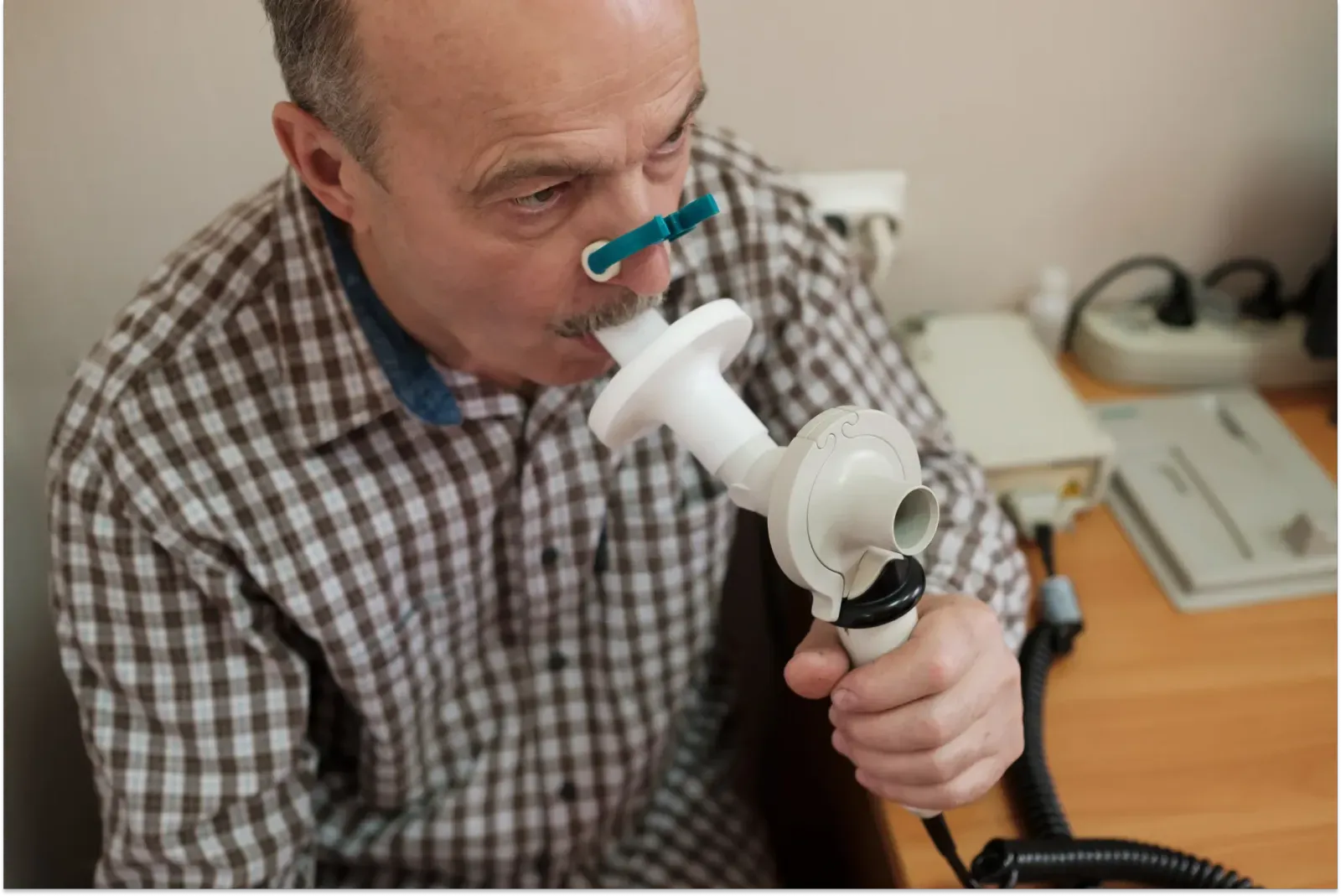
The instructions are short. But specific. No bronchodilators. No smoking. No exercise. Just rest. It feels strange ignoring your inhaler. But that’s what they say. You check again. It’s in bold. You want to sleep. But the tightness creeps in. Quiet and slow.
Breathing becomes something you suddenly notice more
Your chest rises. Then falls. Each time slower than usual. You focus on it now. You wonder if this is how you always breathe. Probably not. The more you think about it, the harder it gets. You yawn too much. You feel dizzy. You stop thinking. Try again.
They ask you to arrive early, but the waiting feels longer
You arrive fifteen minutes early. The room smells sterile. White walls. Quiet people. A screen flashes names. Yours isn’t there yet. A nurse walks by. You watch her shoes. You open your phone. Then close it. You try to breathe slowly. It doesn’t help.
A technician explains the machine with practiced words
He points at a plastic tube. Asks about recent illnesses. Checks your file. You nod. He speaks again. “Breathe normally first.” You stare at the device. It hums. He asks you to sit straight. You feel robotic. You look for a clock. There isn’t one.
You’re told to seal your lips completely around the mouthpiece
Not almost. Not partially. Completely. You try. He adjusts your chin. “Again,” he says. You start. Breathe out slowly. But not enough. “Harder this time.” You try. Still not right. You inhale deep. Hold. Blow. It sounds like wind. Then silence.
The numbers don’t mean anything to you yet
He watches a screen. Doesn’t speak. You wait. Breathing shallow. He nods. Types. Asks for one more. You’re tired. He sees it. “Almost done,” he lies. You try again. Deep breath. Push everything out. You see stars. Then settle. He types again.
You feel lightheaded after just three attempts
Your head swims. Not like spinning. Just… floating. He hands you water. It doesn’t help. You blink fast. He says it’s normal. You don’t believe him. You nod anyway. The room feels brighter now. Too bright. You wipe your hands on your pants.
Each breath is a test you didn’t study for
You think of school. Exams. The same pressure. But this time it’s your lungs. Your effort. You try not to panic. Breathe shallow. Try again. You want to pass. But you don’t know what passing means. He doesn’t say. Just more numbers.
You’re asked to repeat it with a clip over your nose
It pinches. Slightly painful. Uncomfortable. You hate it. But you nod. You pretend it’s fine. You look straight ahead. Mouth sealed. Deep breath. Exhale. Everything burns. He counts silently. You pretend you don’t hear.
The tube feels too small for your breath
You exhale too fast. Or maybe too slow. He says, “Again.” You obey. Again. And again. You want to stop. But don’t. He finally nods. “Good.” You don’t know if he means it. But you’re glad to hear the word.
You didn’t expect to feel this tired afterward
Your chest aches. Not sharply. Just dull and heavy. Like you climbed stairs. But you didn’t. You sat still. You wonder if that’s the point. You rest your hand on your lap. The sweat there surprises you. It shouldn’t.
Your mind races while waiting for the interpretation
You leave the room. But not really. Part of you stays. With the machine. With those numbers. You replay each breath. Too shallow. Too quick. Not enough? Maybe. You don’t know. And won’t know. Not yet.
You remember being told not to eat much before the test
You skipped breakfast. Just coffee. Bad idea. You feel shaky. The technician says it’s normal. You nod. He says that a lot. You wonder if it’s always true. You eat a granola bar in the hallway. Your stomach growls anyway.
The test feels longer than it actually is
You check the time. Only twenty minutes passed. It felt like hours. You feel older. Somehow smaller. Your lungs quieter. You walk slowly to the elevator. Breathing carefully. As if the air might betray you again.
You keep thinking about how something so simple became so hard
It’s just breathing. You do it daily. But under pressure, it changes. Becomes conscious. Mechanical. You hate that feeling. You want to forget it. But you can’t. You feel it in every breath. Still.
No one explains what FEV1 or FVC really means
You Google it. Read definitions. Ratios. Volumes. Flow. You still don’t get it. You stare at numbers. They blur. Normal ranges. Obstructive patterns. You see words like “mild” or “moderate.” You don’t know where you fall.
You worry that your best effort wasn’t enough
You held your breath. Blew hard. Coughed. Tried again. But maybe you messed up. Maybe it’s wrong. You hope they can tell the difference. Between real obstruction and human error. You doubt it. Then hope again.
You didn’t know breathing could feel like a performance
You sat on stage. The machine watched. You had no lines. Just air. Your lungs were actors. Sometimes clumsy. Sometimes graceful. You left the stage unsure. No applause. Just silence.
The tightness in your chest stays longer than you want
It fades. Then returns. You wonder if it’s from the test. Or from thinking too much. You lie down. Inhale deeply. It catches. Then releases. You wait for calm. It takes longer this time.
You overhear others talk about their results
Whispers. “Asthma.” “COPD.” “Normal.” You feel something twist inside. You don’t speak. You smile. But listen. You realize you’re all guessing. No one really knows. Not yet.
The follow-up visit becomes its own kind of test
You sit again. This time across a desk. A doctor flips pages. Speaks slowly. Points. You nod. Even when you don’t understand. You pretend it’s okay. He says the words “monitoring” and “management.” You hear “not over.”
The instructions weren’t complicated, but they still mattered
No caffeine. No tight clothes. No running. It seemed small. But now you wonder. Did you do it right? You wore sneakers. Was that wrong? You think too much. The test is done. But your thoughts keep looping.
You start to recognize what triggers your breathing shifts
Dust. Cold air. Perfume. Talking too long. Laughing too hard. You begin noticing. Before, you missed it. Now, your lungs speak louder. You listen. They’re not always clear. But always present.
The memory of the test returns during quiet moments
You sit at home. The house is silent. Suddenly, you remember. The tube. The breath. That machine. You exhale. It sounds loud. Too loud. You close your eyes. Try again. Softer this time.
Your body feels different knowing it was measured
Measured breath. Recorded effort. You wonder what else could be tracked. You think of steps. Heartbeats. Now lungs. All counted. Labeled. Compared. You feel exposed. Even when clothed.
You never thought about your lungs before this
You knew they worked. That was enough. But now? You notice every inhale. Every wheeze. You join forums. Read stories. You aren’t alone. That helps. A little.
Even normal results don’t mean everything feels fine
The doctor smiles. Says “normal.” But you still struggle some days. Still wheeze. Still pause. You accept that. The numbers say one thing. Your breath says another.
